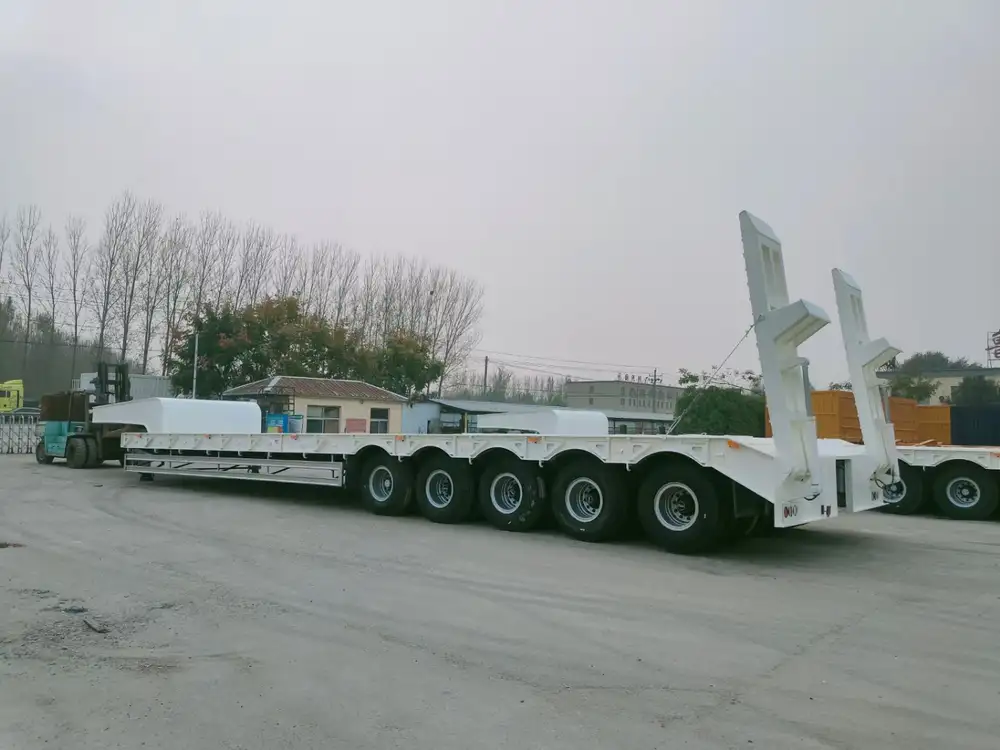In the realm of hauling and transporting materials, belly dump trailers play a vital role due to their efficient unloading capabilities. However, an issue that many operators encounter is the jerking motion experienced when closing these trailers. This phenomenon, while seemingly minor, can significantly impact the operational efficiency and safety of the equipment. In this article, we will dive deep into the various causes of this jerking motion, its implications, and how to prevent it, providing you with a comprehensive understanding useful for maintenance and operational practices.
What is a Belly Dump Trailer?
Belly dump trailers, characterized by their ability to unload cargo through bottom gates, are employed extensively for transporting aggregates, sand, and other bulk materials. The design allows for quick unloading without needing to maneuver the trailer, making them particularly effective for construction and mining operations.
Key Features of Belly Dump Trailers:
| Feature | Description |
|---|---|
| Design | Hopper bottom with dual gates for quick unloading |
| Capacity | Varies from 20 to 40 cubic yards |
| Material | Typically constructed from high-strength steel |
| Mechanism | Hydraulically operated gates for efficient operation |

The Jerking Motion Explained
The jerking sensation when a belly dump trailer closes can occur for a multitude of reasons. To address this issue effectively, we must dissect the potential causes.
Hydraulic System Influence
A significant factor contributing to the jerking motion is the hydraulic system that operates the trailer’s gates. If the hydraulic fluid is not at the correct level or if there is air in the system, the gates may not close smoothly.
Common Hydraulic Issues to Consider:
- Fluid Level: Insufficient hydraulic fluid can lead to inadequate power for smooth operation.
- Air Traps: Air in the hydraulic lines can cause erratic movements.
- Dirty Filters: Clogged filters may restrict fluid flow, leading to pressure inconsistencies.

Mechanical Factors
Several mechanical components can also lead to jerking motions when the belly dump trailer is operated:
- Gate Alignment: Improper alignment of the gates can prevent them from closing evenly, causing a jerk.
- Wear and Tear: Continuous use can lead to worn-out components, leading to difficulty in closing mechanisms.
- Hinge Issues: If the hinges of the gates are rusty or damaged, they won’t pivot smoothly, resulting in a jerking motion.
Load Distribution
The way the cargo is loaded and distributed in the trailer can significantly impact the operational behavior during unloading. Uneven weight distribution can cause the trailer to shift when the gates operate.
Potential Causes Summarized:
| Cause | Description |
|---|---|
| Hydraulic Issues | Insufficient fluid, air in the lines, dirty filters |
| Mechanical Problems | Misalignment, wear, hinge damage |
| Load Distribution | Uneven load can shift the trailer |

Implications of Jerking Motion
Understanding the ramifications of a jerking belly dump trailer is crucial for safety and maintenance. Frequent jerking can lead to:
- Component Damage: Increased wear on hydraulic systems and mechanical components.
- Safety Hazards: Sudden jerking can lead to operator injury or cargo spillage.
- Operational Inefficiency: Delays in unloading can impact overall productivity.
Preventive Measures
To mitigate the jerky motion when closing a belly dump trailer, operators can adopt several preventive measures:
Routine Maintenance Checks
Regular maintenance checks are essential. Here’s a quick checklist:
- Hydraulic System Inspection:
- Check fluid levels and quality.
- Inspect hydraulic lines for leaks or air traps.
- Mechanical Maintenance:
- Ensure gates are aligned properly.
- Lubricate hinges and inspect for wear.

Adjusting Load Procedures
Train operators on proper loading techniques to ensure even weight distribution, reducing potential shifts during unloading.
Upgrading Components
For older models, consider upgrading the hydraulic system or replacing worn-out parts to enhance smooth operation. Investing in high-quality components can lead to improved performance.
Training and Operator Familiarization
Providing training for operators with a focus on the nuances of belly dump trailer operation can significantly reduce the occurrence of jerky movements.

Troubleshooting Steps for Operators
If jerking occurs, operators should follow these troubleshooting steps to identify and remedy potential issues:
- Evaluate Hydraulic Oil Levels: Confirm that the hydraulic system is topped up with clean fluid.
- Inspect the Gate Mechanism: Check for alignment and smooth operation.
- Analyze Loading Patterns: Review loading practices for even distribution.
- Check for Wear and Tear: Look for signs of damage or wear on mechanical parts.
Conclusion
Understanding the causes of jerking in belly dump trailers when closing is vital for maintenance, safety, and efficiency. By addressing hydraulic, mechanical, and loading issues, operators can ensure smoother operation, prolonging the life of their equipment and enhancing safe working conditions. Regular inspections, proper training, and an awareness of potential pitfalls can mitigate jerking occurrences and optimize operational workflows.
Equipping yourself and your team with this knowledge can make a significant difference, underscoring the importance of proactive maintenance and training in the successful operation of belly dump trailers. In the competitive landscape of hauling and logistics, ensuring that your equipment performs at its best is not just an added value—it’s a necessity for sustained success.



